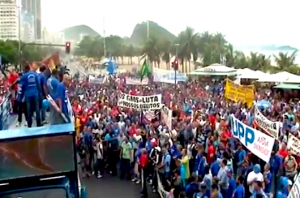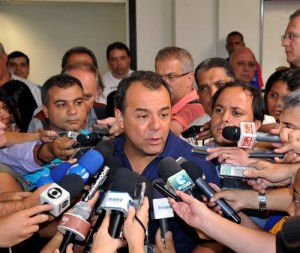THE NEW YORK TIMES - Police Threaten Strike Before Carnival / Polícias ameaçam greve antes do Carnaval
Police Threaten Strike Before Carnival
By Sarah de Sainte Croix, Senior Contributing ReporterRIO DE JANEIRO, BRAZIL – Rio’s public security forces, the Polícia Civil, Polícia Militar and Bombeiros (Firefighters) are threatening to go on strike during the 2012 Carnival period if demands over increased wages and better working conditions are not met. On Sunday morning, organizers estimated thousands turned out to demonstrate in front of the Copacabana Palace Hotel, protesting against what unions say are the lowest wages for firefighters and police officers in the country.

Police and firefighters protest outside Copacabana Palace in the rain on January 29th, image recreation.
Sunday’s action happened in spite of a notice issued on Friday by Rio’s State Governor, Sérgio Cabral, announcing an increase in remuneration for civil and military police officers, firefighters and prison staff, amounting to a claimed total rise of 39.4 percent over the two year period between 2012 and 2013.
According to the Jornal do Brasil, the current monthly wage for a military police officers ranges from R$1,277 to R$1,471. A first to third sergeant can receive between R$1,723 and R$2,087 per month, and higher ranking officers can earn up to R$6,122.
Cabral has promised increases totaling 11.55 percent for January and February this year. For 2013 he has pledged a total rise of 26.54 percent, including 10.15 percent in February, and 13.84 percent in October next year.

State Governor Sergio Cabral has come to the table over a wage dispute with public security forces, photo by Valter Campanato/ABr.
Speaking to the Jornal do Brasil, Corporal Gurgel, said, “With this … adjustment, it is as if we will have received a ten percent adjustment this year, another ten percent in 2013, and the same percentage in 2014. Allowing for inflation of six percent per year, it is the same as receiving an adjustment only four percent per year.”
Sergio Pina, a member of Rio’s Civil Police Workers Union (Sindpol RJ), told the Rio Times, “This is the country of World Cup 2014 and the next Olympic Games. Firefighters and police officers [earn] … approximately R$1,000 per month… The world must know that Dilma, our President, spends billions to host these events, while their leading security personnel have been forced to seek second jobs due to low salaries.”
He also warned that the success of the police pacification units (UPPs) could be undermined if the wage dispute is not resolved.
However, in a statement to the press, Governor Sérgio Cabral pointed out that, “Between January 2007 and October 2013, these workers will have received a cumulative readjustment of 100 percent, without taking into account bonuses and benefits.”
One Rio resident commented, “[Carnival] is obviously a strong point of leverage for the unions, and without any security at all, it would be a very dangerous thing. However, I don’t think the federal government would let that happen. If it comes to it, they’ll send the army in.”
In June of 2011 the Rio Firefighters went on a prolonged strike which led to clashes with police forces. Again in October both postal workers and bank workers also went on strike in an effort to effect wages.
TRADUÇÃO:
Polícias ameaçam greve antes do Carnaval
31 de janeiro de 2012
Por Sarah de Sainte Croix, Reporter Contribuindo Senior
RIO DE JANEIRO, BRASIL - As forças de segurança pública do Rio de Janeiro, a Polícia Civil, Polícia Militar e Bombeiros (Bombeiros) estão ameaçando ir em greve durante o Carnaval 2012 período se as demandas sobre os salários aumentaram e melhores condições de trabalho não forem cumpridas. Na manhã de domingo, os organizadores estimado milhares acabou por demonstrar na frente do Hotel Copacabana Palace, protestando contra o que os sindicatos dizem que são os mais baixos salários para bombeiros e policiais no país.
A greve proposta deve começar em 10 de fevereiro - apenas sete dias antes do início deste ano oficial do Carnaval celebrações.
Ação de domingo aconteceu apesar de uma notificação emitida na sexta-feira pelo governador do Rio de Janeiro Estado, Sérgio Cabral, anunciando um aumento na remuneração dos policiais civis e militares, bombeiros e agentes penitenciários, totalizando um aumento reivindicado total de 39,4 por cento sobre o período de dois anos entre 2012 e 2013.
De acordo com o Jornal do Brasil, o salário mensal atual para um policiais militares varia de R $ 1.277 a R $ 1.471. O primeiro a sargento terceiro pode receber entre R $ 1.723 e R $ 2.087 por mês, e mais oficiais de patente pode ganhar até R $ 6.122.
Cabral prometeu aumento no total de 11,55 por cento para janeiro e fevereiro deste ano. Para 2013, ele prometeu um aumento total de 26,54 por cento, incluindo 10,15 por cento em fevereiro, e 13,84 por cento em outubro do próximo ano.
Segundo a nota divulgada pelo Governo do Estado, os aumentos vão ser eficazes em ambos os salários e pensões, e beneficiará cerca de 119.673 pessoas, incluindo agentes em serviço e não servir, e aposentados, mas os manifestantes argumentam que isso não é suficiente.
Falando ao Jornal do Brasil, Cabo Gurgel, disse: "Com este ajuste ..., é como se nós terá recebido um ajuste de dez por cento este ano, outros dez por cento em 2013, e o mesmo percentual em 2014. Permitindo que a inflação de seis por cento ao ano, é o mesmo que receber um ajuste apenas quatro por cento ao ano. "
Sergio Pina, um membro da Polícia Civil do Rio de Janeiro Sindicato dos Trabalhadores (Sindpol RJ), disse ao Times Rio, "Este é o país da Copa do Mundo de 2014 e os próximos Jogos Olímpicos. Bombeiros e policiais [ganhar] ... cerca de R $ 1.000 por mês ... O mundo deve saber que Dilma, nossa presidente, gasta bilhões para sediar esses eventos, enquanto que o seu pessoal de segurança líderes foram forçados a procurar um segundo emprego devido aos baixos salários. "
Ele também alertou que o sucesso das unidades de Polícia Pacificadora (UPP) pode ser prejudicado se a disputa de salários não for resolvido.
No entanto, em um comunicado à imprensa, o governador Sérgio Cabral assinalou que, "Entre janeiro de 2007 e outubro de 2013, esses trabalhadores terão recebido um reajuste acumulado de 100 por cento, sem levar em conta bônus e benefícios."
Um morador do Rio, comentou: "[o Carnaval] é, obviamente, um forte ponto de alavancagem para os sindicatos, e sem nenhuma segurança em tudo, seria uma coisa muito perigosa. No entanto, eu não acho que o governo federal deixaria isso acontecer. Se isso chegar a acontecer, eles vão enviar o exército dentro "
Em junho de 2011 o Corpo de Bombeiros do Rio foi em uma prolongada greve que levou a confrontos com forças policiais. Mais uma vez, em outubro de ambos os trabalhadores dos correios e os bancários também entraram em greve numa tentativa de melhores salários.


Nenhum comentário:
Postar um comentário